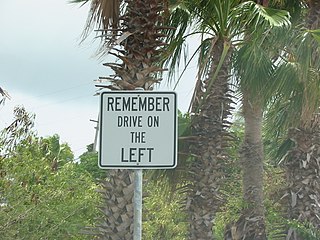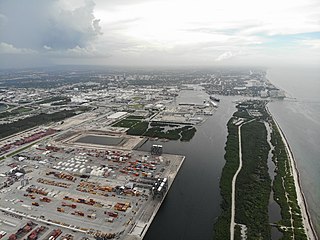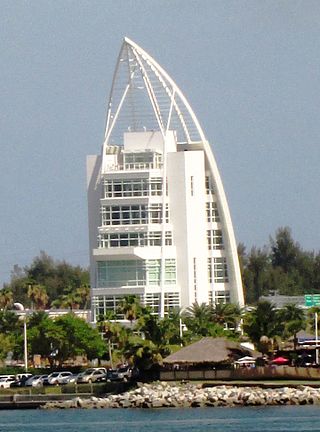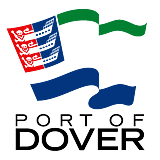
The United States Virgin Islands (USVI) is the only place under United States jurisdiction where the rule of the road is to drive on the left. However, virtually all passenger vehicles are left hand drive due to imports of U.S. vehicles.

Port Everglades is a seaport in Fort Lauderdale, Florida, located in Broward County. Port Everglades is one of South Florida's foremost economic engines, as it is the gateway for both international trade and cruise vacations. In 2022, Port Everglades was ranked the third-busiest cruise homeport, accommodating more than 1.72 million passengers. Port Everglades' cargo sector has been climbed up the rankings based on its operational performance among 348 seaports in the world.

The Port of Miami, styled as PortMiami and formally known as the Dante B. Fascell Port of Miami, is a major seaport located in Biscayne Bay at the mouth of the Miami River in Miami, Florida. It is the largest passenger port in the world and one of the largest cargo ports in the United States.

The Port of San Juan is a large seaport facility in and around San Juan Bay in Puerto Rico. Primarily located within the capital municipality of San Juan, the Port of San Juan consists of multiple public and private passenger and cargo facilities. Public facilities are administered by the Puerto Rico Ports Authority (PRPA), under the Department of Transportation and Public Works of Puerto Rico.

The Port of Boston is a major seaport located in Boston Harbor and adjacent to the City of Boston. It is the largest port in Massachusetts and one of the principal ports on the East Coast of the United States.

The Saint Johns River Ferry, also known as the Mayport Ferry, is an automobile ferry between Mayport and Fort George Island, two areas within Jacksonville, Florida. The 0.9 miles (1.4 km) voyage crosses the Saint Johns River about 2.5 miles (4.0 km) inland of the river's mouth and travels in an east-west direction for approximately 2,000 feet (610 m) on State Road A1A. It departs every half-hour.

Port Tampa Bay, known as the Port of Tampa until January 2014, is the largest port in the state of Florida and is overseen by the Tampa Port Authority, a Hillsborough County agency. The port is located in Tampa, Florida near downtown Tampa's Channel District. The port directly accesses Tampa Bay on the western coast of the Florida Suncoast, and is approximately 25 sea miles from the Gulf of Mexico. The port district includes parts of Tampa Bay, Hillsborough Bay, McKay Bay, Old Tampa Bay and the Hillsborough River. The port serves container ships, tank ships, and cruise lines.

Port Canaveral is a cruise, cargo, and naval port in Brevard County, Florida, United States. The port has the busiest cruise terminals in the world. In 2022, the port had over 4 million passengers passing through it during the fiscal year. Additionally, over 5.4 million tonnes of bulk cargo moves through each year.

The Jacksonville Metropolitan Area, also called the First Coast, Metro Jacksonville, or Northeast Florida, is the metropolitan area centered on the principal city of Jacksonville, Florida and including the First Coast of North Florida. As of the 2020 census, the total population was 1,605,848. The Jacksonville–Kingsland–Palatka, FL–GA Combined Statistical Area (CSA) had a population of 1,733,937 in 2020 and was the 34th largest CSA in the United States. The Jacksonville metropolitan area is the 40th largest in the country and the fourth largest in the State of Florida, behind the Miami, Tampa, and Orlando metropolitan areas.

The Port of Mobile is a deep-water port in Mobile, Alabama, United States. It is the only deep-water port in Alabama. It was ranked by the United States Army Corps of Engineers as the 9th largest port by tonnage in the nation during 2014, with a trade volume of 64.3 million tons. This ranking had increased from 12th largest during 2010, with a trade volume of 55,713,273 tons, an increase of 19.1%.

The Port of New York and New Jersey is the port district of the New York-Newark metropolitan area, encompassing the region within approximately a 25-mile (40 km) radius of the Statue of Liberty National Monument.

The Port of Dover is a cross-channel ferry, cruise terminal, maritime cargo and marina facility situated in Dover, Kent, south-east England. It is the nearest English port to France, at just 34 kilometres (21 mi) away, and is one of the world's busiest maritime passenger ports, with 11.7 million passengers, 2.6 million lorries, 2.2 million cars and motorcycles and 80,000 coaches passing through it in 2017, and with an annual turnover of £58.5 million a year. This contrasts with the nearby Channel Tunnel, the only fixed link between the island of Great Britain and the European mainland, which now handles an estimated 20 million passengers and 1.6 million trucks per year.
The JAXPORT Cruise Terminal is a 63,000 sq ft (5,900 m2) "temporary" cruise ship terminal in Jacksonville, Florida. The facility located at the northwest corner of the Dames Point Marine Terminal, beside the Dames Point Bridge. It was completed in six months during 2003 and is a facility at the Port of Jacksonville, administered by the Jacksonville Port Authority. The baggage handling area is 28,000 sq ft (2,600 m2); and a passenger embarkation section has 15,000 sq ft (1,400 m2). Vehicle access to the site is via Hecksher Drive and there is paved parking for about 600 cars.

The Port of Jacksonville (JAXPORT) is an international trade port on the St. Johns River in Jacksonville, Florida. JAXPORT is the largest port by volume in Florida, and the 14th largest container port in the United States. It carries about 18 million short tons of cargo each year and has an annual economic impact of over $31 billion, including 138,500 jobs across the state of Florida related to cargo moving through the port. It handled 1,338,000 containers, and is the second largest handler of vehicles in the United States with 696,500 in 2019.

The Port of San Diego is a seaport in San Diego, California. It is located on San Diego Bay in southwestern San Diego County, and is a self-supporting district established in 1962 by an act of the California State Legislature. In addition to port activities, the Port District controls San Diego Bay and owns and manages the bay's immediate waterfront under the state's Tidelands Trust.
The Jacksonville Aviation Authority (JAA) is the independent government agency that owns and operates the four airports of Jacksonville, Florida, US. It was established in 2001 after being branched off of the Jacksonville Port Authority.

Blount Island is an island of approximately 2,000 acres (8.1 km2) on the St. Johns River in Jacksonville, Florida, nine nautical miles (16.7 km) west of the Atlantic Ocean. One of three public cargo facilities at the Port of Jacksonville is located there, and it is also the site of the United States Marine Corps Blount Island Command.

The Jacksonville transportation network includes ground, air, and sea options for passenger and freight transit. The Jacksonville Port Authority (Jaxport) operates the Port of Jacksonville, which includes container shipping facilities at Blount Island Marine Terminal, the Talleyrand Marine Terminal and the Dames Point Marine Terminal. Jacksonville Aviation Authority managers Jacksonville International Airport in Northside, as well as several smaller airports. The Jacksonville Transportation Authority (JTA) operates bus, people mover, and park-n-ride services throughout the city and region. A major bus terminal at the intermodal Rosa Parks Transit Station serves as JTA's main transit hub. Various intercity bus companies terminate near Central Station. Amtrak operates passenger rail service to and from major cities throughout North America. The city is bisected by major highways, I-95 and I-10, I-295 creates a full beltway around the city.

The Northside is a large region of Jacksonville, Florida, and is generally understood as a counterpart to the city's other large regions, the Urban Core, Arlington, Southside, Westside, and the Beaches. The expansive area consists of historic communities, cultural landmarks, protected ecosystems and vital transportation and logistics facilities, all fundamental to the history and development of Jacksonville.
Southeast Toyota Distributors LLC, (SET) founded in 1968, is the top private distributor of Toyota vehicles in the world. They are franchised by Toyota Motor Sales, USA to sell vehicles and parts to car dealerships in the five states of Alabama, Florida, Georgia, South Carolina and North Carolina. SET is a wholly owned subsidiary of JM Family Enterprises. Corporate headquarters of both are located at Deerfield Beach, Florida. Primary operations are located in Jacksonville, Florida.

















